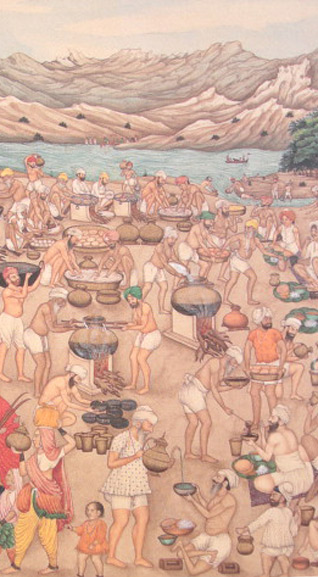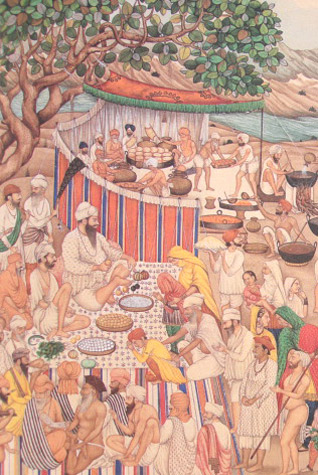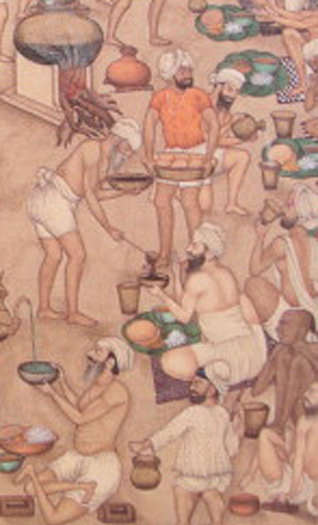Columnists
The Jewel of Peace:
True Liberation Transcends Both Poverty and Wealth
EK ONG KAAR KAUR
As the conclave to elect the new Catholic Pope begins, some of the more liberal-leaning media have shined a spotlight on “Liberation Theology.” The question they have raised is this: can someone be elected Pope who supports this theological approach to dealing with social injustice and poverty?
Wikipedia describes Liberation Theology as “an interpretation of Christian faith through the poor’s suffering, their struggle and hope. [It is also] a critique of society, the Catholic faith and Christianity through the eyes of the poor.”
Some proponents of Liberation Theology argue that God especially favors the poor. Liberation Theology also maintains that sin is the root of the social injustice that accompanies economic inequality.
Of course, strong advocates of the “free market,” arguably a mythological invention all on its own, have a decided dislike of Liberation Theology. There have been backroom power struggles within the Catholic Church around these issues, according to some of the media reports I have been reading.
This is the first time in my life that I have heard about Liberation Theology, even though it was developed in the 1950’s-60’s. I am not an expert on the subject. However, the conversation has provoked some questions in my own mind.
• Is there something similar to Liberation Theology in the teachings and example of the Sikh Gurus?
• Do the poor have special claim on the Guru’s grace?
• What is the Guru’s view of wealth?
• What is the root cause of the social injustice that comes from economic inequality?
These are questions that fascinate me. I was raised Catholic, and poverty was very clearly taught as a virtue, at least in terms of living a spiritual life. Yet, economic inequality creates a lot of needless pain and suffering for the poor.
When I look at the life and teachings of the Sikh Gurus, I see some themes emerge. One is how the Gurus addressed the pain of poverty by giving people the confidence and skills to create a decent livelihood for themselves. Yet, at the same time, the Gurus recognized wealth as a trap or block to spiritual growth, when people become attached to it. This creates an interesting dynamic in the Sikh tradition when it comes to the questions of wealth, poverty and grace.
Let us look at the first aspect – giving people a chance to exit poverty. Guru Nanak, the first Master, lived over 500 years ago. He traveled through what is now India, Pakistan, Tibet, Southwest Asia, the Middle-East – potentially even as far as Russia. After many many years of traveling on foot, teaching, inspiring and healing people, he settled into the life of a farmer. And as a farmer, he and his successors fed people. They just fed them.
As humans, our most basic needs are water, food and shelter. When our fundamental needs are in question, there is no way to self-actualize. To develop talents. To create. To look into the deeper meaning of life. When people do not know where their next meal is coming from, their energy gets absorbed in trying to find it.
I always find it fascinating that after traveling for thousands of miles on foot, encountering so many villages, tribes and cultures, Guru Nanak seems to have come to a simple conclusion. For the human race to be healed, the first step is to feed each other.
As the Sikh tradition developed over the course of 250 years and ten consecutive Masters, a corner stone of the culture was to make food available to the entire community. Anyone could come and eat in the Guru’s kitchen. It was called “langar.” You did not have to “become a Sikh” to get a meal. The most basic level of security was provided as a gift from the Guru to whoever chose to take that gift. With a full belly, people were given a step up from the most fearful and basic insecurity that poverty creates.
Guru Nanak and his successors also taught against the caste system. The caste system is a religiously sanctioned social structure rooted in Hinduism, where one’s trade and place in the social hierarchy depended upon one’s birth. A child grew up to become whatever his parents and grandparents had been, regardless of the child’s individual talents and interest.
The Sikh Gurus did not recognize the validity of the caste system. In that context, the Sikhs had a chance to develop themselves and their skills however they could. From hundreds of years ago until today, Sikhs are taught to earn honestly, to share what they have with others, and then to do their own meditation. In other words, develop yourself spiritually, earn a living and take care of your neighbors – regardless of status or creed.
It is a pretty simple social formula for creating a peaceful and prosperous world.
And this is, indeed, what happened. As the generations progressed, the Sikh community slowly became a very prosperous one. And as the wealth of the Sikhs grew, they began attracting the unwanted attention of those who tried to tax or steal that wealth by force. This led to the development of the spiritual warrior and the right of self-defense in Sikh history. But that is an essay for another day.
When we look at Sikh history, it is fair to say that poverty is not a virtue in Sikh Dharma. Rather, the Gurus created a social climate where people could feel a basic level of security, and then have the opportunity to develop their talents, and earn a living.
Yet, at the same time, when we look at the writings of the Sikh Gurus, we also see a similar spiritual theme to other religious traditions. Namely, that the pride of the wealthy blocks them from experiencing the grace of the Divine.
Guru Arjan, the fifth Master, lived from 1563 to1606. During his life, he composed a beautiful teaching-song called Sukhmani – The Jewel of Peace. Sukhmani is a deeply practical and spiritual poem. In the 12th section of Sukhmani, Guru Arjan addresses this issue of pride. To poetically paraphrase the opening lines of the 12th section,
“The humble and the poor who contain themselves live happily.
But the great and mighty arrogant people, O Nanak, melt in pride.”
Reading these lines, it strikes me that the issue for the Sikh is not poverty or wealth. The issue is self-restraint versus arrogance. When wealth and power come to a person, it is a deep test of consciousness. Because, temporarily, wealth and power give a person the illusion that they can “DO SOMETHING.” That they are the Doer. But Sukhmani is a very subtle explanation that the human being does nothing at all. We simply experience what the hand of the Divine brings us and what It takes away from us. When wealth comes, it is a gift. How our consciousness responds to that gift shows us where we are in our spiritual journey.
Another poetic phrasing from section 12-5 of Sukhmani:
“After earning thousands, he wakes up and chases hundred of thousands.
But satisfaction doesn’t come to him. He only attains illusion.
There is no satisfaction at all -- he is corroded and corroded until he dies.
Indulging in so many sensual pleasures poisons him.
Without contentment, no one can rule.”
These lines help illuminate the core issue. On the one hand, people have the right to feel secure, earn honestly and come out of poverty. On the other hand, wealth can act like a drug. When people get attached to it as their sole sense of security, they just want more and more. The pursuit of wealth, for its own sake, can imbalance the mind. And in that imbalance of pride, arrogance, and dissatisfaction, a person can waste the preciousness of human life.
From section 12-2 of Sukhmani:
“People become egomaniacs when wealth comes to them.
Yet nothing equal to even a blade of grass will accompany them when they go …
By the sweet gift of the Guru, the Teacher who takes one from darkness to light, pride is erased.
Those servants, O Nanak, are embraced in the court of Divinity.”
While Liberation Theology seems to argue that grace is more prevalent for the poor than the wealthy, this does not seem to match Guru Arjan’s words. The problem is not wealth, in and of itself. The problem is the ego and pride that can accompany wealth. Divine grace allows the pride and attachment to wealth to go.
In this way, there is a middle ground. Poverty can be alleviated through a social structure of mutual support, where people have a chance to develop themselves and share with each other. But when wealth endangers the mind, the spiritual teachings of the Guru help bring a person back from the destructive edge of pride. For Guru Arjan, the key is to remember who the actual Doer is. Then the mind is better equipped to handle what comes and goes.
There are natural cycles in life. Sometimes we are better off. Sometimes we are worse off. Sometimes there is expansion and happiness. Sometimes there is destruction and sadness. But if, through the Guru’s teachings, we can surrender our pride – our illusion that “I” am the Doer, and embrace “Thou” – that You are the Doer, this is the liberating grace for the Sikh.
From 12-1 of Sukhmani:
“Those who take pride in their wealth and their land
Are foolishly blind and ignorant.
When Your kindness prevails, Divine One, the heart becomes humble.
Then, Oh Nanak, those hearts are liberated and they find peace hereafter.”
Conversation about this article
1: Baldev Singh (Bradford, United Kingdom), March 13, 2013, 8:24 AM.
Very powerful article! If your existence is in Truth, says Guru Nanak, then you don't need liberation ... you ARE liberated. This 'liberation' myth and associated brainwashing industry is but a scam which has corrupted the world.
2: Navneet (USA), March 13, 2013, 10:51 AM.
Very interesting writing ... thanks for sharing.
3: Harcharan Singh (London, United Kingdom), March 13, 2013, 12:56 PM.
Beautifully explained. While the world promises liberation while plundering in its name, Sikhi simply offers help, support and comfort to the needy and the weak. Salvation is personal and can't be traded or bartered. In Sikhi, service to others -- in addressing their worldly needs, not in promising them something that is not ours to give -- is the ultimate worship of and service to God.
4: Gina Kaur (Arkansas, USA), March 13, 2013, 7:18 PM.
The poor and the homeless, the weak and the voiceless, the oppressed and the downtrodden, need no theology. What they need is a hand to pull them up. That is the path of Sikhi. They who claim they want to help by saving the souls of those who, instead, need worldly help, are merely on a frolic and a scam of their own. Thank you, Ek Ong Kaar Kaur ji, for saying it so well. Bless you.
5: Ajit Singh Batra (Pennsville, New Jersey, USA..), March 13, 2013, 10:08 PM.
Sikhism is governed by the philosophy of "jo deesai so tayraa roop" [GGS:724]. That is, "All you see (in this world) is His form." We were all created by the One; with His light all of creation came into being. All disputes or conflict over who is poor and who is wealthy or who is good and who is bad, disappear when we let go of the 'otherness' within human life.





